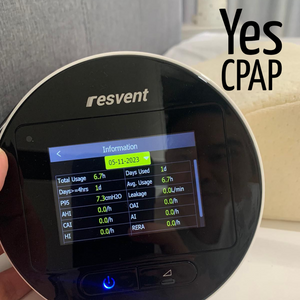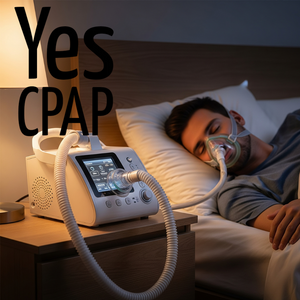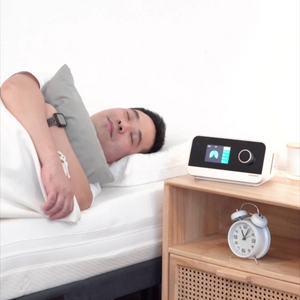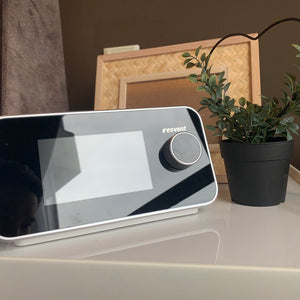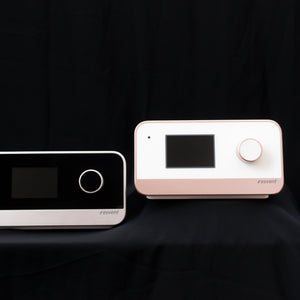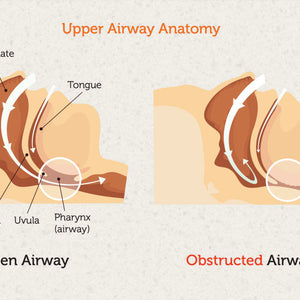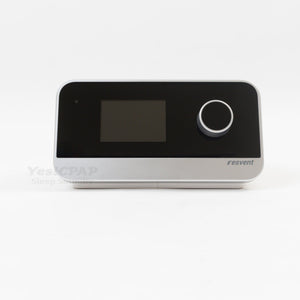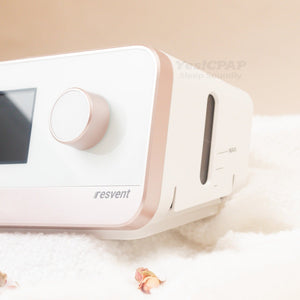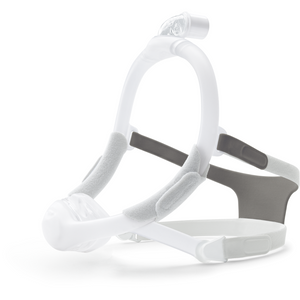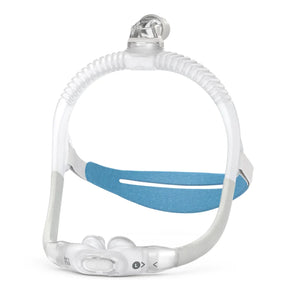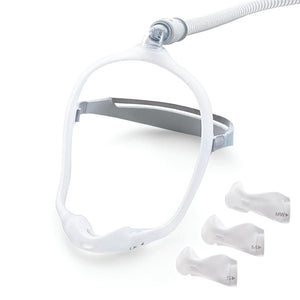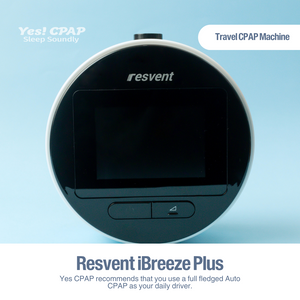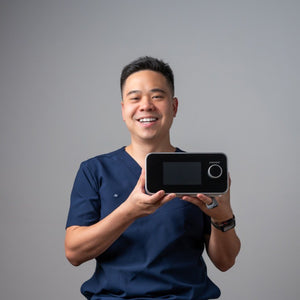Learn about sleep apnea symptoms, testing, and treatment options in Singapore. Based on real medical research from Singapore hospitals.
What is Sleep Apnea? Understanding the Basics
Sleep apnea happens when your breathing stops and starts repeatedly during sleep. Think of it like this: your throat muscles relax too much and block your airway. However, your brain wakes you up briefly to restart breathing, often without you knowing it.
This might sound scary, but here's the good news: sleep apnea is very treatable once you know you have it.
Why Should You Care About Sleep Apnea?
Sleep apnea does more than just cause loud snoring. Moreover, it prevents you from getting deep, restful sleep. As a result, you wake up tired even after sleeping 8 hours.
Furthermore, untreated sleep apnea can lead to serious health problems like high blood pressure, heart disease, and stroke. Therefore, getting tested and treated is crucial for your long-term health.
Sleep Apnea in Singapore: The Real Numbers
Let's look at what research tells us about sleep apnea in Singapore. These numbers come from real medical studies published in respected journals.
Key Singapore Sleep Apnea Facts:
30.5% of Singapore adults have moderate to severe sleep apnea. This finding comes from a major study published in Respirology journal by researchers from National University Hospital and Ng Teng Fong General Hospital (research link).
91% don't know they have it. The Singapore Health Study 2012 found that most people with sleep apnea have never been diagnosed (research details).
Different rates among ethnic groups: The same study found Chinese (32.1%), Malays (33.8%) and Indians (16.5%) have different rates of sleep apnea.
60.5% have positional sleep apnea. Research from Changi General Hospital shows this is much higher than the 27.4% found in Western countries (published study).
These numbers tell us two important things: sleep apnea is very common in Singapore, and most people don't realize they have it.
Think you might have sleep apnea? Professional testing can give you clear answers. Learn about sleep testing options →
How to Recognize Sleep Apnea: Simple Warning Signs
Sleep apnea has two types of symptoms: what happens at night and how you feel during the day.
Night-Time Signs to Watch For
Loud snoring - Not just occasional snoring, but loud, persistent snoring that bothers others in the house.
Stopping breathing during sleep - Your partner might notice you stop breathing for several seconds, then gasp or choke.
Restless sleep - You toss and turn a lot, wake up frequently, or kick off covers.
Night sweats - You wake up sweating even when the room isn't hot.
Frequent bathroom trips - You need to urinate multiple times during the night.
Day-Time Signs That Affect Your Life
Always feeling tired - You feel exhausted even after a full night's sleep.
Morning headaches - You wake up with headaches that get better as the day goes on.
Trouble concentrating - You have difficulty focusing at work or remembering things.
Falling asleep easily - You doze off during movies, meetings, or while reading.
Mood changes - You feel irritable, anxious, or depressed more often.
Experiencing several of these symptoms? Getting tested is the smart next step. Find testing options →
Sleep Testing in Singapore: Your Options Explained
If you think you have sleep apnea, you need a sleep study to confirm it. You have two main choices in Singapore: hospital testing or home testing.
Hospital Sleep Studies
Singapore has excellent hospital sleep centers that can diagnose sleep apnea:
Singapore General Hospital - Has the largest sleep center in Singapore with specialists from different medical fields. They see patients at six different locations.
Changi General Hospital - Their doctors have published important research about sleep apnea in Singapore (research published here).
National University Hospital - Contributed to major Singapore sleep studies and offers comprehensive sleep testing.
Hospital testing is very thorough but usually requires waiting several weeks for an appointment.
Home Sleep Testing
Home sleep testing lets you get tested in your own bed. Moreover, the equipment is professional-grade and gives accurate results.
Benefits of Home Testing:
- Sleep in your own bed - You get more natural sleep patterns
- No waiting lists - You can start testing quickly
- Less expensive - Costs less than hospital studies
- Professional equipment - Uses the same quality monitors as hospitals
- Expert analysis - Qualified sleep technologists review your results
The home testing process is simple: a technologist comes to your home to set up the equipment, you sleep normally, and they return the next morning to collect it.
Learn more about home sleep testing →
CPAP Treatment: The Most Effective Solution
If your sleep study shows you have sleep apnea, CPAP therapy is usually the first treatment doctors recommend. CPAP stands for "Continuous Positive Airway Pressure."
How CPAP Works (Simple Explanation)
Think of CPAP like a gentle air compressor. It blows air through a mask you wear over your nose or face. However, this isn't just any air - it's pressurized just enough to keep your throat open while you sleep.
When your throat tries to collapse (which causes sleep apnea), the CPAP air pressure holds it open. As a result, you breathe normally all night long.
Why CPAP Works So Well
Medical studies show CPAP is over 95% effective when used properly. Furthermore, most people notice improvements within the first few nights of using it.
CPAP Machines for Singapore's Climate
Singapore's hot, humid weather creates special challenges for CPAP users. Therefore, you need equipment designed for tropical conditions.
Resvent iBreeze Auto CPAP: Smart Pressure Control
This machine automatically adjusts air pressure based on your breathing needs throughout the night. Moreover, it includes features specifically helpful in Singapore's climate. See iBreeze features →
What Makes It Special:
- Auto-adjusting pressure - Changes pressure as needed during sleep
- Built-in humidifier - Adds moisture to prevent dry throat
- Heated tubing - Stops water condensation in Singapore's humidity
- Quiet operation - Won't disturb your partner's sleep
- Phone app - Tracks your sleep progress
Resvent iBreeze Pro: Extra Comfort Features
This upgraded version includes additional comfort features that many users prefer. Furthermore, it has special settings that work well for different sleeping styles. Explore Pro features →
Extra Benefits:
- Gentler pressure changes - More comfortable for sensitive users
- Even quieter operation - Ultra-quiet for light sleepers
- Advanced humidity control - Perfect for Singapore's climate
- Elegant design - Looks good in any bedroom
Resvent iBreeze Plus Travel: For Frequent Travelers
If you travel often for work or leisure, this portable version gives you full CPAP therapy anywhere. Additionally, it's small enough to fit in carry-on luggage. Check travel options →
Travel Advantages:
- Very lightweight - Only 1.8kg total weight
- Battery powered - Works without electricity for camping
- Airline approved - Meets all travel requirements
- Universal plugs - Works in any country
- Protective case - Keeps equipment safe during travel
iBreeze Auto BiPAP: For Complex Cases
Some people need different air pressures when breathing in versus breathing out. This BiPAP machine provides that flexibility. Learn about BiPAP →
When You Might Need BiPAP:
- CPAP feels uncomfortable - Easier to breathe with BiPAP
- Complex sleep apnea - When regular CPAP isn't enough
- Lung problems - BiPAP can help with breathing difficulties
CPAP Masks: Finding Your Perfect Fit
The mask is the part of CPAP that touches your face. Therefore, getting the right fit is crucial for comfort and effectiveness.
Philips DreamWear Silicone Pillows: Minimal Contact
This mask touches very little of your face, making it perfect for people who feel claustrophobic. Moreover, the air tube connects at the top of your head instead of in front of your face. See minimal contact design →
Why People Love It:
- Barely touches your face - Great for claustrophobic feelings
- Clear vision - You can read or watch TV easily
- Side sleeper friendly - Tube won't get in the way
- Cool in Singapore's heat - Less contact means less sweating
Philips DreamWear Under the Nose: Balanced Comfort
This mask sits under your nose instead of over it. Furthermore, it provides a good balance between comfort and effectiveness. Explore under-nose design →
Philips DreamWisp Full Face: Complete Coverage
If you breathe through your mouth while sleeping, you need a full face mask. This one covers both your nose and mouth. View full face options →
ResMed AirFit P30i: Innovative Design
This mask has the air tube connecting at the top of your head, giving you more freedom to move around. Check innovative features →
CPAP Treatment Costs in Singapore: What to Expect
Let's be honest about costs so you can plan accordingly. However, remember that treating sleep apnea is an investment in your health and quality of life.
Sleep Testing Costs
Home Sleep Testing - Professional testing with expert analysis and quick results. Much more affordable than hospital testing.
Hospital Sleep Studies - More expensive but sometimes covered partially by MediSave if medically necessary.
CPAP Equipment Costs
CPAP Machines - Complete systems with all necessary accessories for effective treatment. Professional setup and training included with purchase.
CPAP Masks - Various styles and sizes to ensure proper fit and comfort. Replace every 3-6 months for best results.
Ongoing Supplies - Filters, tubing, and other supplies need regular replacement to maintain effectiveness.
Making Treatment Affordable
Payment Options - Flexible payment plans available to make treatment accessible.
Insurance Coverage - Some private insurance plans provide partial coverage. Documentation provided for claims.
Promotional Savings - Regular promotions and discount codes help reduce costs.
Explore current pricing and promotions →
Starting CPAP: What to Expect in Your First Month
Starting CPAP therapy is like learning any new habit. Most people need 2-4 weeks to get completely comfortable with it.
Week 1: Getting Used to the Equipment
What's Normal:
- Feeling strange - It's normal to feel weird wearing a mask at first
- Mask adjustments - You might need to try different positions
- Some air leaks - Small leaks are common while learning proper fit
Tips for Success:
- Start slow - Try wearing the mask while awake and watching TV
- Practice breathing - Get used to breathing with the air pressure
- Be patient - Every night gets a little easier
Week 2-3: Building the Habit
What Changes:
- Better sleep quality - You'll start noticing deeper sleep
- Less snoring - Your partner will definitely notice this improvement
- Easier mask wearing - Putting on the mask becomes routine
Week 4+: Experiencing the Benefits
Health Improvements You'll Notice:
- More energy - You'll wake up feeling actually rested
- Better concentration - Work and daily tasks become easier
- Improved mood - Less irritability and better emotional balance
- Morning headaches gone - No more waking up with headaches
Professional Support Throughout
You don't have to figure this out alone. Professional support includes:
- Home setup training - Complete instruction on using your equipment
- First month check-ins - Regular contact to address any issues
- Pressure adjustments - Fine-tuning settings for maximum comfort
- 24/7 technical support - Help whenever you need it
Maintaining Your CPAP in Singapore's Climate
Singapore's hot, humid weather requires special care for your CPAP equipment. However, daily maintenance only takes about 5 minutes.
Daily Care (5 Minutes Each Morning)
Step 1: Empty the Water Chamber Pour out any remaining water from the humidifier and rinse with distilled water.
Step 2: Clean Your Mask Wipe the mask cushion with a damp cloth to remove oils from your skin.
Step 3: Air Dry Everything Let the mask and tubing air dry in a well-ventilated area.
Step 4: Wipe the Machine Clean the outside of the machine with a slightly damp cloth.
Weekly Deep Clean (15 Minutes)
Once a Week:
- Wash all removable parts with mild soap and warm water
- Rinse thoroughly to remove all soap residue
- Air dry completely before putting everything back together
- Check for wear and replace parts if needed
Singapore Climate Tips
Use Distilled Water Only - Singapore's tap water has minerals that can damage your equipment over time.
Ensure Good Air Circulation - Let everything dry completely in Singapore's humidity.
Replace Filters More Often - Singapore's air quality means filters get dirty faster.
Use Heated Tubing - This prevents water condensation that's common in humid climates.
Why Choose Professional Sleep Medicine Support
Getting CPAP equipment is just the beginning. Success comes from having professional support throughout your treatment journey.
What Professional Support Includes
Proper Equipment Selection - Choosing the right machine and mask for your specific needs and sleeping style.
Professional Setup - Complete installation and training in your home so you know exactly how to use everything.
Ongoing Monitoring - Regular check-ins to ensure your therapy is working effectively and you're comfortable.
Technical Support - Help with any equipment issues or questions that come up.
Therapy Optimization - Adjusting settings and equipment as needed for the best results.
The Importance of Qualified Technologists
Look for providers with proper credentials:
RPSGT Certification - Registered Polysomnographic Technologists have specialized training in sleep medicine.
HSA Compliance - Equipment should meet Singapore Health Sciences Authority standards.
Ongoing Education - Good providers stay current with the latest sleep medicine developments.
Your Sleep Improvement Action Plan
Ready to address your sleep apnea? Here's a simple step-by-step plan to get you started.
Step 1: Recognize the Signs
Review the symptoms we discussed earlier. If several apply to you, it's worth getting tested.
Step 2: Get Professional Testing
Home sleep testing is the fastest way to get answers. The process is simple, convenient, and gives you results quickly.
Step 3: Review Your Results
A qualified sleep technologist will explain your results in simple terms and recommend the best treatment approach.
Step 4: Choose Your Equipment
Based on your diagnosis, lifestyle, and preferences, select the CPAP machine and mask that will work best for you.
Step 5: Start Treatment with Support
Professional setup and ongoing support ensure you get the maximum benefit from your treatment.
Educational Resources for Better Understanding
Learn More About Sleep Apnea
Knowledge helps you make better decisions about your health. Therefore, educational resources can deepen your understanding of sleep apnea and treatment options.
Sleep Apnea Documentary: Singapore Perspectives - Local stories and expert insights about sleep apnea in Singapore.
Support for Family Members
Sleep apnea affects the whole family, not just the person who has it. Partners lose sleep from snoring, and everyone worries about the health effects.
Gift Cards for Treatment - Sometimes the best gift you can give someone is better health and sleep.
Take Action for Better Sleep Tonight
Sleep apnea is serious, but it's also very treatable. The sooner you address it, the sooner you can start enjoying better sleep and better health.
Ready to Get Started?
✅ Professional Sleep Testing - Get clear answers about your sleep health
✅ Singapore Climate CPAP Equipment - Designed to work well in our tropical weather
✅ Comfortable Mask Options - Find the perfect fit for your face and sleeping style
✅ Professional Support - Expert guidance every step of the way
The Benefits Start Immediately
Most people notice improvements within the first few nights of CPAP treatment:
- Better sleep quality with fewer interruptions
- More energy during the day
- Improved concentration at work and home
- Better mood and relationships
- Health protection against serious complications
Don't wait another night for better sleep. Explore your treatment options now →
Common Questions About Sleep Apnea in Singapore
How common is sleep apnea in Singapore?
Research shows 30.5% of Singapore adults have moderate to severe sleep apnea, making it very common. However, 91% don't know they have it.
Are there differences between ethnic groups?
Yes, studies show Chinese (32.1%), Malays (33.8%) and Indians (16.5%) have different rates of sleep apnea.
Is home sleep testing accurate?
Yes, modern home sleep testing equipment provides results comparable to hospital studies. Moreover, you get more natural sleep patterns in your own bed.
How does Singapore's climate affect CPAP?
Singapore's humidity requires heated tubing and good humidification. However, modern CPAP machines are designed to handle tropical climates well.
Will insurance cover my treatment?
Some private insurance plans provide partial coverage. MediSave may cover certain medical expenses when prescribed by a doctor.
How long does it take to get used to CPAP?
Most people adapt within 2-4 weeks. Furthermore, professional support during this period greatly improves your success.
Remember: This guide provides educational information based on published medical research. Everyone's situation is different, so consult with healthcare professionals for personalized advice about your sleep health.
Medical Emergency: If you have severe breathing problems, chest pain, or other serious symptoms, seek immediate medical attention.
Research Sources:
- Tan A, et al. "Prevalence of sleep-disordered breathing in a multiethnic Asian population in Singapore." Respirology. 2016. Read study
- Loh HJ, et al. "Prevalence of positional obstructive sleep apnoea in Singapore." Singapore Medical Journal. 2021. Read study
- Hsu PP. "Recognising sleep apnoea." Singapore Medical Journal. 2015. Read study




